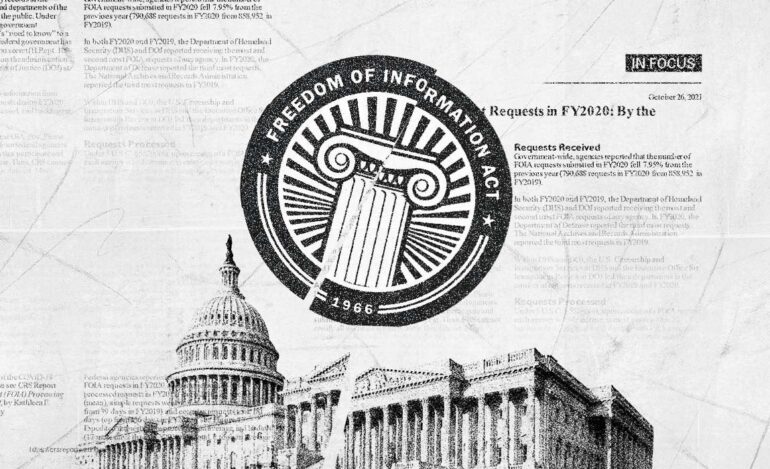TL;DR:
- The State Department is exploring AI and automation tools to expedite FOIA requests and improve service levels.
- The Technology Committee is studying agencies’ tool usage and addressing challenges through AI implementation.
- FOIA professionals can process unclassified records remotely, but classified records require in-office handling.
- The State Department developed the e-Records Archive, optimizing record search capabilities.
- Automation, including machine learning models, has improved accuracy and saved significant processing time.
- AI can assist in leveraging released information and refining records searches for timely responses.
- The department launched an online request platform to track FOIA status and supports the “release to one, release to all” policy.
- Educating the FOIA community about AI opportunities and limitations is a priority.
- Collaborative interagency platforms are being explored to optimize FOIA processing for agencies with limited IT budgets.
Main AI News:
In an effort to expedite Freedom of Information Act (FOIA) requests and elevate its service to requesters, the State Department is exploring the integration of artificial intelligence (AI) and automation tools. The department aims to streamline the FOIA processing governmentwide, while also fostering public comfort and familiarity with AI and machine learning concepts.
Eric Stein, the deputy assistant secretary for the Office of Global Information Services and co-chairman of the Chief FOIA Officers Council’s Technology Committee, acknowledges the hesitations surrounding AI but emphasizes the importance of acclimating people to its potential benefits. To gain insights into the tools employed by various agencies and address their challenges, the Technology Committee extensively analyzed the most recent Chief FOIA Officer reports.
Agencies are grappling with the mounting influx of FOIA requests, necessitating innovative strategies to effectively manage the workload. In the fiscal year 2022 alone, the federal government encountered a staggering surge, receiving over 900,000 new FOIA requests. Stein notes that existing tools are operating at their maximum capacity, and there persists a heavy reliance on manual procedures for capturing, storing, and searching records.
While federal employees can process most FOIA requests concerning unclassified records remotely, the handling of classified records necessitates the physical presence of FOIA professionals in the office. Stein acknowledges the challenge this poses and seeks to strike a balance between recruitment and retention efforts to accommodate employees’ preferences regarding remote or in-office work.
Pioneering AI Initiatives at the State Department
In response to the escalating workload, the State Department has taken proactive measures, introducing its e-Records Archive. This comprehensive repository, housing more than 3 billion department records, is the culmination of the meticulous efforts of chief FOIA officers over the past decade. By establishing metadata standards and optimizing record capture, the archive enables robust search capabilities.
Automation is being embraced to enhance the FOIA request filing process. Through a pilot program, the department trained a machine learning model using historical data of human reviews and declassifications, resulting in a remarkable accuracy rate of approximately 97-99% when compared to human FOIA professionals. This pilot initiative has already saved the department an estimated six months’ worth of work.
The State Department is also exploring the utilization of AI in leveraging information previously released under FOIA to support incoming requests. By establishing more sophisticated connections among information and refining records searches, AI has the potential to provide faster responses and assist in scoping broad requests. Stein emphasizes the need to enhance the efficiency of results and mitigate potential challenges posed by ambiguous search terms or colloquial language.
Continued Efforts and Future Outlook
While initial FOIA pilots incorporating automation have displayed promising results, Stein acknowledges that a comprehensive understanding of how best to harness this emerging technology is still in progress. Acknowledging that failures can be valuable learning opportunities, he emphasizes the importance of sharing successful strategies to save time and resources across agencies.
To enhance the user experience and reduce the volume of inquiries, the State Department has recently launched an online request platform that enables users to track the status of their FOIA requests. Additionally, the department upholds the “release to one, release to all” policy, posting documents released under FOIA to its virtual reading room. Stein and his team strive to streamline this process further through automation, but acknowledge the manual nature of current procedures and the necessity for progress.
Educating and Collaborating for Effective AI Integration
To facilitate the broader adoption of AI, the State Department’s Technology Committee conducted an “AI 101 course” to equip FOIA professionals with a comprehensive understanding of AI’s potential and limitations. This initiative aims to dispel misconceptions and foster a common understanding of this transformative technology. Furthermore, the Chief FOIA Officers Council held the “NextGen FOIA Tech Showcase” to explore AI, machine learning, and tools that enhance the customer experience of filing FOIA requests.
While AI tools may not be necessary for agencies with specific and straightforward FOIA processes, Stein highlights the importance of considering individual agency requirements when implementing technology solutions. To optimize FOIA processing for agencies with limited IT budgets, the Technology Committee is actively exploring collaborative interagency platforms. By leveraging shared platforms and managing information securely, agencies can maximize efficiency and resource allocation.
Conclusion:
The State Department’s efforts to harness AI and automation for FOIA processing signify a growing trend in the market. By leveraging these technologies, the department aims to enhance efficiency, reduce manual workloads, and provide faster responses to FOIA requests. This shift towards AI integration also emphasizes the importance of educating and upskilling professionals in the FOIA community. As more government agencies adopt AI-driven solutions, there will be opportunities for technology providers to offer tailored tools and platforms that streamline FOIA processes across the market.

